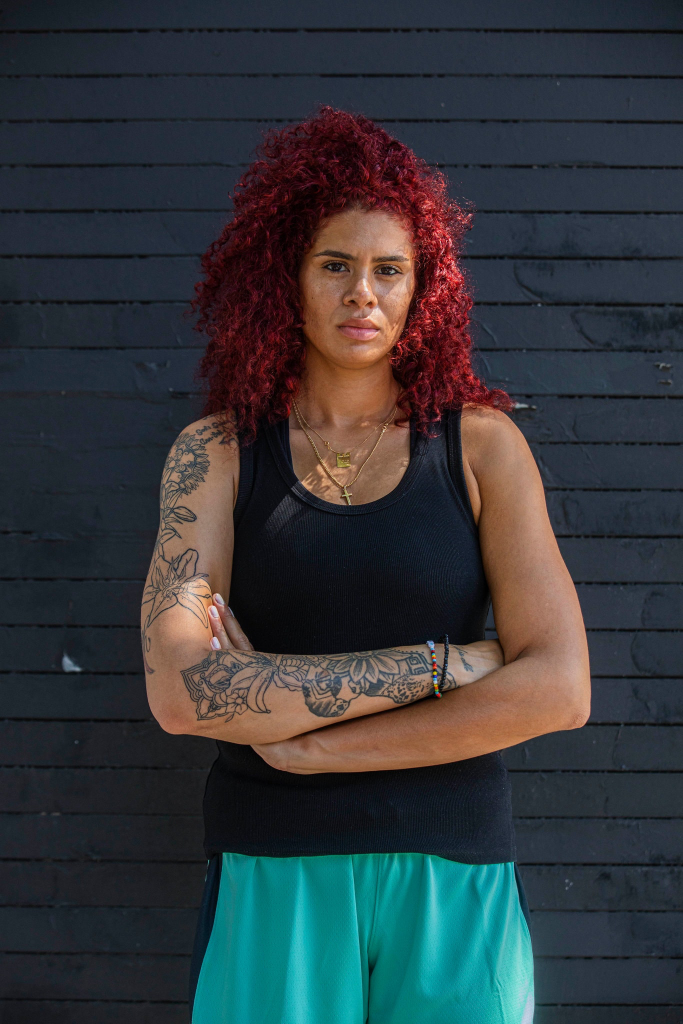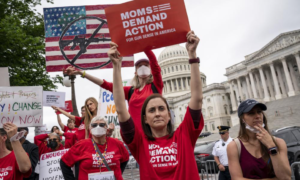
Amanda Zahui B. wanted to rush back to the U.S. after George Floyd’s death. But she realized there was work to be done back home.
Four years ago, the Liberty became one of the first professional sports franchises to make a unified on-court statement against police brutality and racial injustice. Even before Colin Kaepernick drew widespread attention for kneeling during the N.F.L. preseason later that summer, the Liberty took the court for a game wearing black shirts that said #BlackLivesMatter.
That summer had a profound impact on Liberty center Amanda Zahui B., who had arrived in the United States just three years earlier, to attend the University of Minnesota.
In a locker room led by Tina Charles, Swin Cash, Tanisha Wright and Carolyn Swords, Zahui B. absorbed herself in discussions with nuanced views of race, mental health and womanhood.
Those conversations came rushing back to mind recently for Zahui B., the daughter of a French-Spanish mother and father from the Ivory Coast, after the killing of George Floyd in police custody in Minneapolis.
She had been quarantining in her hometown, Stockholm, when she learned about Floyd’s death. Initially, she felt beckoned to the marches in Minneapolis and the ones outside Barclays Center in Brooklyn, the Liberty’s future home arena.
She then recalled something her former Liberty teammates had emphasized to international players years ago: the importance of pushing for change abroad, not only in the United States.
And so, before she returned to Brooklyn to prepare for the start of the W.N.B.A. season at the end of this month, Zahui B. focused her efforts on issues in Sweden, promoting protests and boycotts to drive Swedes to confront what she described as an unspoken history of racial inequality.
“We don’t talk about race here,” Zahui B., 26, said last month from her apartment in Dalen, located in the Southside of Stockholm. “Minneapolis, I wanted to march the streets with everyone. I wanted to do whatever I can do for that community. But at the same time, we have so much work to do in Sweden. You have to start at home.”
Zahui B. grew up in neighborhoods heavily populated by African immigrants who, like her father, Alex Zahui Bazoukou, toiled to find work in Stockholm. Last year, the Swedish government reported 231,276 African Swedes living in the country.
Zahui B.’s mother, Ann-Sofi, who was born in Sweden and settled in Stockholm after a nomadic childhood, helped start Sara Bokhandel, which claims to be the first Kurdish bookstore in Europe. Zahui B. recalled rifling through children’s books translated into Arabic, like the Swedish classic “Pippi Longstocking.”
But as she grew up, Zahui B. found that the diverse environments she was raised in were largely ignored in much of Sweden.
As an example, she pointed to media representations. There is the popular show “Svenska Hollywoodfruar” (“Swedish Hollywood Wives”), which features a cast of blond-haired and blue-eyed women. And in televised games of the Swedish women’s national team, Zahui B. said, broadcasters flock to her over teammates with darker complexions.
“We don’t really promote people of color out here, and if we do, we are very light,” Zahui B. said.
Sofia Ulver, a marketing professor at Lund University in Sweden, agreed that race was seldom talked about in Sweden. She helped write a study submitted for peer review earlier this month that examined racial and ethnic representation in Swedish television commercials.
Ulver noted a history of legislative efforts in Sweden that have sought to negate race as a concrete source of bias to be considered in lawmaking — an approach that some critics argue ignores the existence of actual racism.
“We have huge integration problems in Sweden,” said Ulver, who added that before World War II, Sweden openly promoted the concept of genetic superiority among certain races. “We have not been good at integrating new multicultural groups that are coming in. It’s hugely segregated.”
Zahui B. said her family always encouraged open dialogue, but it wasn’t until a May 2016 trade to the Liberty that she became comfortable with expressing vulnerability.
Zahui B., who said she had wrestled as a child with the concept of “being Black in Europe and being viewed as a white person when I’m in the Ivory Coast,” said Charles challenged her to think deeply about what it means to be a Black woman in the modern world.
“You see now people coming from a point of separation to: How do we come together for one thing to affect change?” said Wright, who is now an assistant coach with the Las Vegas Aces. “During that season, we were already there. We were a microcosm of what we happen to see now.”
Eventually, Zahui B. felt comfortable enough to drive conversations about what actions the team should take throughout the 2016 season. That summer, the Liberty wore black warm-up shirts with messages supporting the Black Lives Matter movement and staged a media blackout, and at least one player sat during the national anthem. Cash began asking Zahui B. about race in Sweden, which led to discussions about the similar issues in the two countries.
“She started to unlay herself and became outspoken, someone who wanted to impact and leave a lasting impression on you,” said Charles, who is now with the Washington Mystics.
For Zahui B., those conversations allowed her to elucidate emotions that had previously felt muted and muddled — feelings that stemmed from being followed around stores and banks in Stockholm, her instinct to drive with two hands on the steering wheel and with her driver’s license out next to her in case she was pulled over.
“Sometimes I have a wall up because I know how the world is,” Zahui B. said. “I speak up, and I’m going to get something back. But learning how to really show that I’m actually human — like, I cry myself to sleep, I have nightmares, we all go through depression and we are all scared and upset — that’s kind of like the growth I’ve had, especially since coming to the Liberty.”
Last month, Zahui B. discussed the idea of organizing a Black Lives Matter protest in Stockholm with her agent and local activists before joining one already planned for June 3. Zahui B. publicized the march on Instagram, where she estimates a majority of her 15,000-plus followers are Swedish.
Emboldened by the thousands of Swedes who marched, Zahui B. contacted all of the major news stations in Sweden, offering to discuss race on live air. In response, some radio stations proposed interviews about basketball, instead.
“I said no,” Zahui B. said. “I want to talk about what really matters.” She added that she has refrained from giving interviews with certain Swedish stations until they made a concerted effort to address race in their coverage.
As an alternative, Zahui B. has begun posting unfiltered Instagram videos about race to her largely Swedish audience.
Zahui B. said it did not bother her if such conversations were uncomfortable for viewers, as she considers them necessary for progress. After the June 3 protest, for example, her neighbor greeted her in the hallway of her building and asked how she was doing.
She responded that she was tired of seeing Black people unjustifiably killed, and said that if he didn’t want to have a conversation about that, then he didn’t have to speak to her ever again.
“I’m being kind of direct and planting a seed in people’s heads,” Zahui B. said. “I do not need you to tell me you’re sorry or that you understand how I feel. I need you to actually make a change and go home and have a conversation with your family, with your kids.




